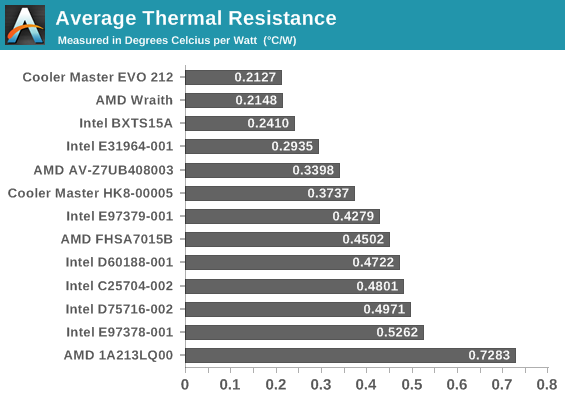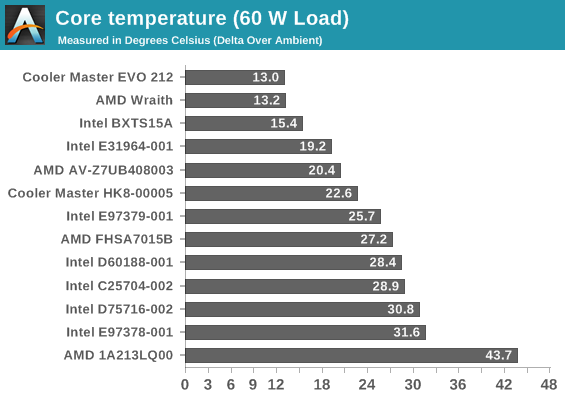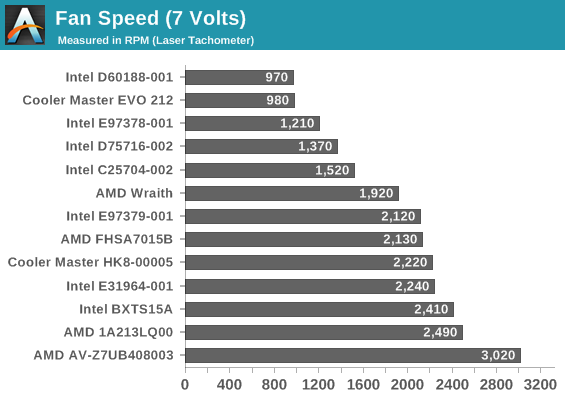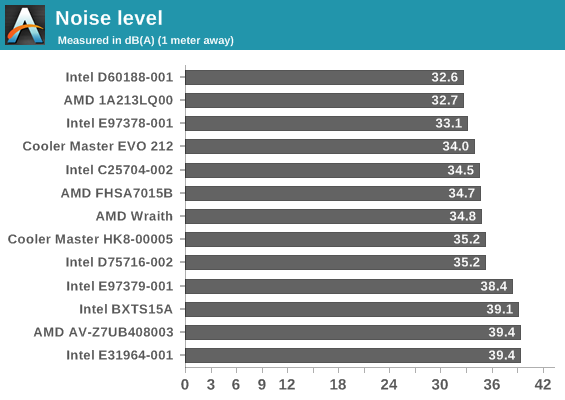Battle of The CPU Stock Coolers! 7x Intel vs 5x AMD, plus an EVO 212
by E. Fylladitakis on July 22, 2016 9:00 AM EST- Posted in
- Cases/Cooling/PSUs
- CPUs
- AMD
- Intel
- Cooler Master
- Cooler
Testing Results, Low Fan Speed (7 Volts)
Intel’s E97379-001 and AMD’s AV-Z7UB408003 coolers are equipped with automatic speed correction circuitry and adjust their speed to the maximum regardless of the input voltage. This renders the majority of basic fan controllers, rheostats and simple fan speed reduction resistors useless. Their speed can only be controlled via a PWM signal from a motherboard. The E97379-001 did have a small speed drop with an input of 6.5V and we included those results, but the AV-Z7UB408003 was rather adamant and devoid of a PWM signal would always automatically correct its speed to 3000 RPM, giving us the exact same performance results as before.

Again, the three most powerful coolers take the top spots at reduced power.

| Core Temperature, Constant Thermal Load (Low Fan Speed) |
Similarly to the 12V results, the EVO, Wraith and BXTS15A are taking the top spots. It's useful to note that EVO 212 and the Wraith are essentially equal as the power increases, with the Wraith being marginally ahead at very high thermal loads.


Putting the two "abnormal" coolers with non-adjustable fan settings aside, the thermal performance of the other coolers decreased almost equally, leaving their standings untouched. The D75716-002 still performs similarly to the C25704-002 and the D60188-001, but the former still is the loudest and the latter still is the quietest of the three. As a matter of fact, the D75716-002 is louder than the C25704-002, even though the fan is slower, hinting that either the fan has a worse engine or the denser fins significantly increased the airflow resistance of the cooler.
We cannot compare the AV-Z7UB408003 cooler to the rest of AMD’s coolers due to the autocorrecting fan. Nevertheless, we can make a useful observation looking at the Cooler Master’s HK8-00005 performance. Despite it has a slightly lower mass compared to that of the FHSA7015B and virtually the same fan, its thermal performance is much better, showcasing how two simple heatpipes can significantly increase the efficiency of a cooler.
Once again, AMD’s Wraith goes directly head to head with Cooler Master’s EVO 212, only this time the Wraith also compares in terms of acoustic comfort. There is virtually no difference between the two coolers in terms of thermal performance and both are equally silent with their fan input voltage reduced down to 7 Volts. The Intel BXTS15A does compare in terms of thermal performance but falls significantly behind when it comes to acoustics, as the cooler remains clearly audible even with its fan’s speed reduced by nearly 40%.










82 Comments
View All Comments
bigboxes - Friday, July 22, 2016 - link
Yup. My Athlon X2 4400+ (Toledo) came with a 4-pipe cooler as well. Never used the stock HSF when it was in my main rig. Got a Zalman which was badass at the time. Used the stock HSF when I moved the Athlon 3200+ (Winchester) to my file server.Marburg U - Friday, July 22, 2016 - link
OK, but just to recall that DB scale is a logarithmic scale. And the difference between 44.7 and 46.3 is roughly 45% power ratio!!!ZeDestructor - Friday, July 22, 2016 - link
Perceptually though, odds are you won't observe a difference in loudness (tone is a whole different ballgame): 3dB is the generally accepted number for human hearing to be able to perceive a difference in volume, and 10dB for a perceptual halving of volume.DanNeely - Friday, July 22, 2016 - link
But also remember that your ears are a logarithmic sensor. So while 10 dB is 10x the sound intensity, it only sounds twice as loud. In this case the 1.6 dB only corresponds to sounding about 15% louder; which is barely noticeable. Other factors like your case material (type, thickness, if sound deadening material is present, locations of fan holes, etc) affecting how much sound gets out from the CPU cooler; and the number, type, and layout if your case fans affecting how hot the internal ambient is and how hard your CPU cooler has to work will all have more significant impacts on how loud your system is.pseudoid - Friday, July 22, 2016 - link
Ummmmm....Logarithmic scale to measure Sound Pressure Levels (SPL) are normally a relative measurement based on voltage (not power). As such, an order of magnitude increase (10X) results in a 20dB (not 10dB) increase in SPL. Keeping with the same SPL measurements, a doubling (octave) or an increase of twice as loud (2x) is a 6dB increase! No need to bring up Fletcher-Munson curves into this correction. Cheers!
hailey14 - Friday, July 22, 2016 - link
"With bulk PC orders it is, of course, a "difference" scenario..."some typo.
Calculatron - Friday, July 22, 2016 - link
Wow, I knew the Wraith cooler is good, but I didn't realize that it was that good.I have the "quiet" 125 TDP cooler solution, which is the Wraith Cooler without the fancy shroud - same heatsink and fan, though. Maybe I'll keep it around...
Lolimaster - Friday, July 22, 2016 - link
The thing intel non 2011 socket cpu's uses complete trash internal dissipation compound, another reason to not sell it with stock cooler.Even with a decent one (juper 212z) you see load temps of 75°C without OC. Meanwhile their new Broadwell-E stays within the 50°C (+/- 2°C) with a similar cooler.
AMD didn't screw up users with the IHS dissipation.
ZeDestructor - Sunday, July 24, 2016 - link
As many have stated before, Intel has to use TIM on the small cores because the small cores crack from repeated thermal shock when soldered to the IHS. Intel doesn't want to screw you over, but they literally have to! Or do you want 32nm and larger lithographies back?Ascaris - Sunday, July 24, 2016 - link
They could use a bigger chunk of silicon wafer to help with heat dissipation/bond to the IHS without printing anything on it. It's not as if the smaller litho chips have gotten cheaper because of less silicon usage!